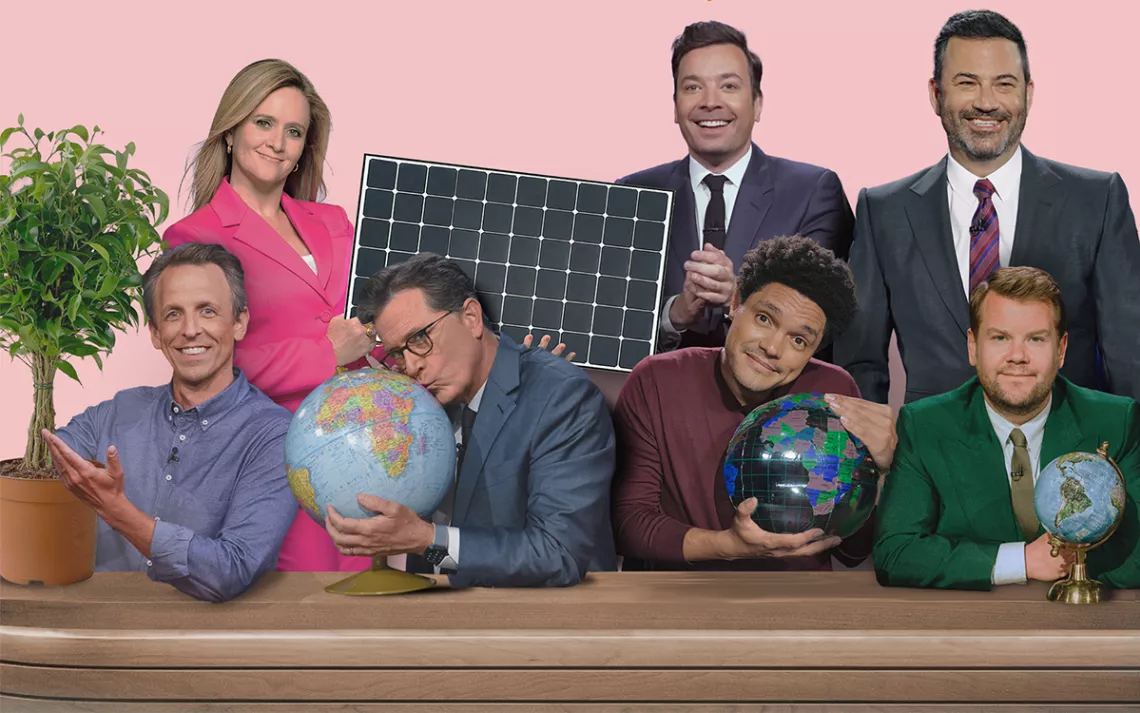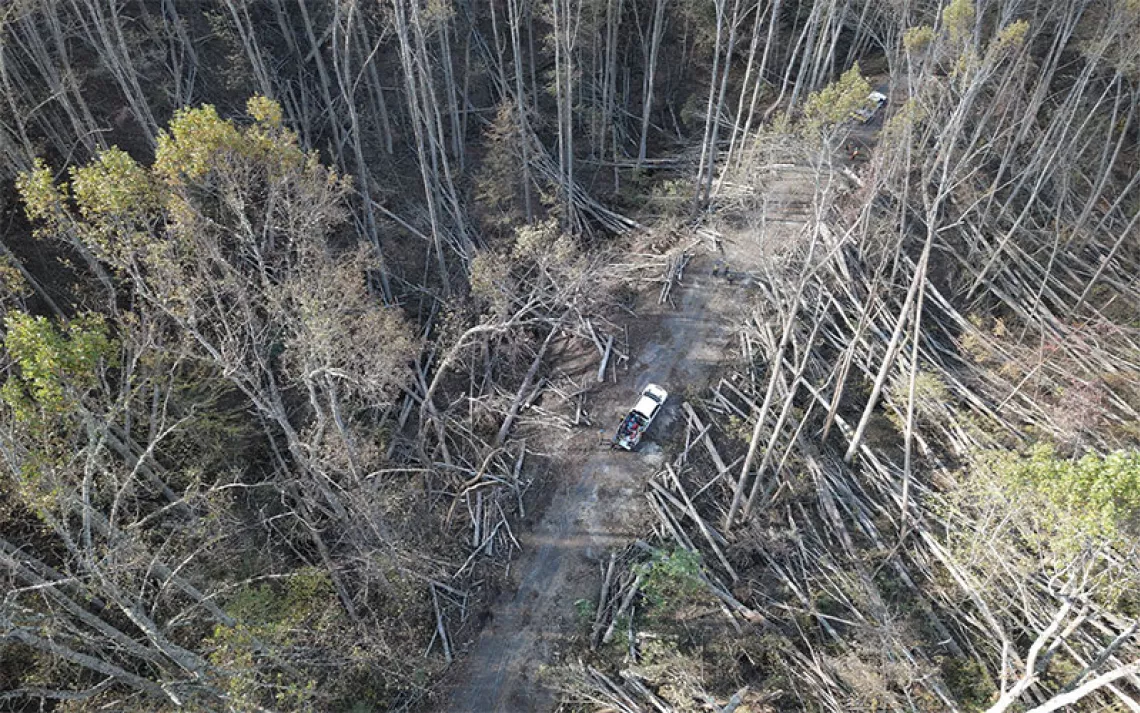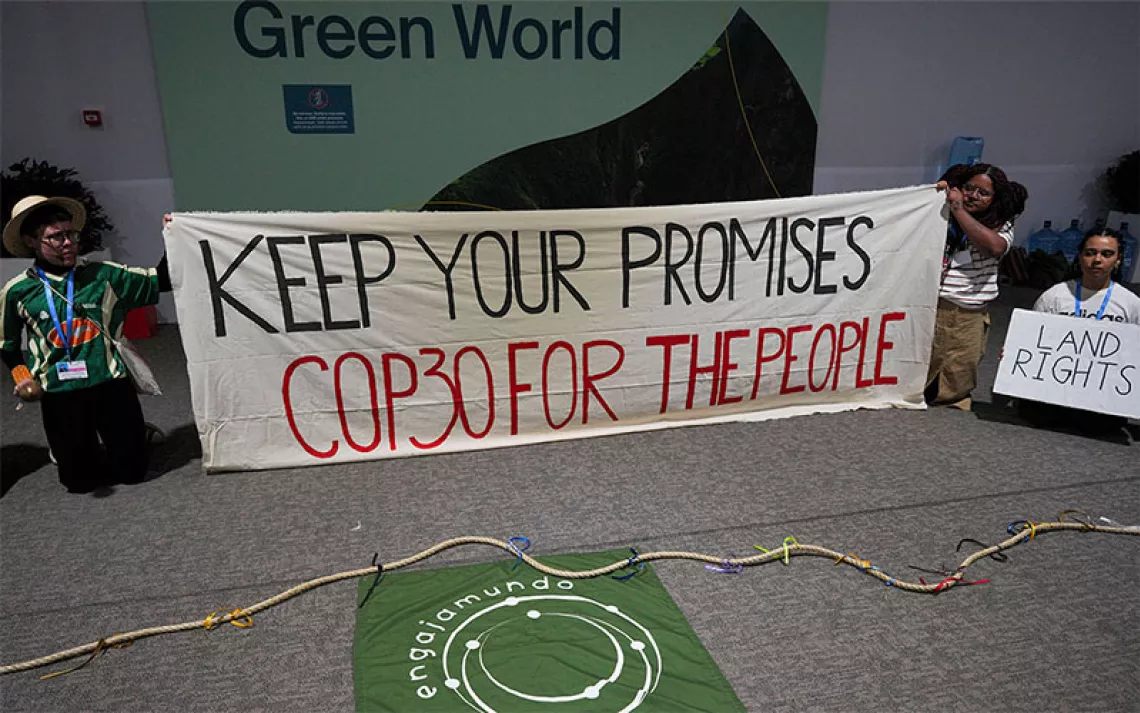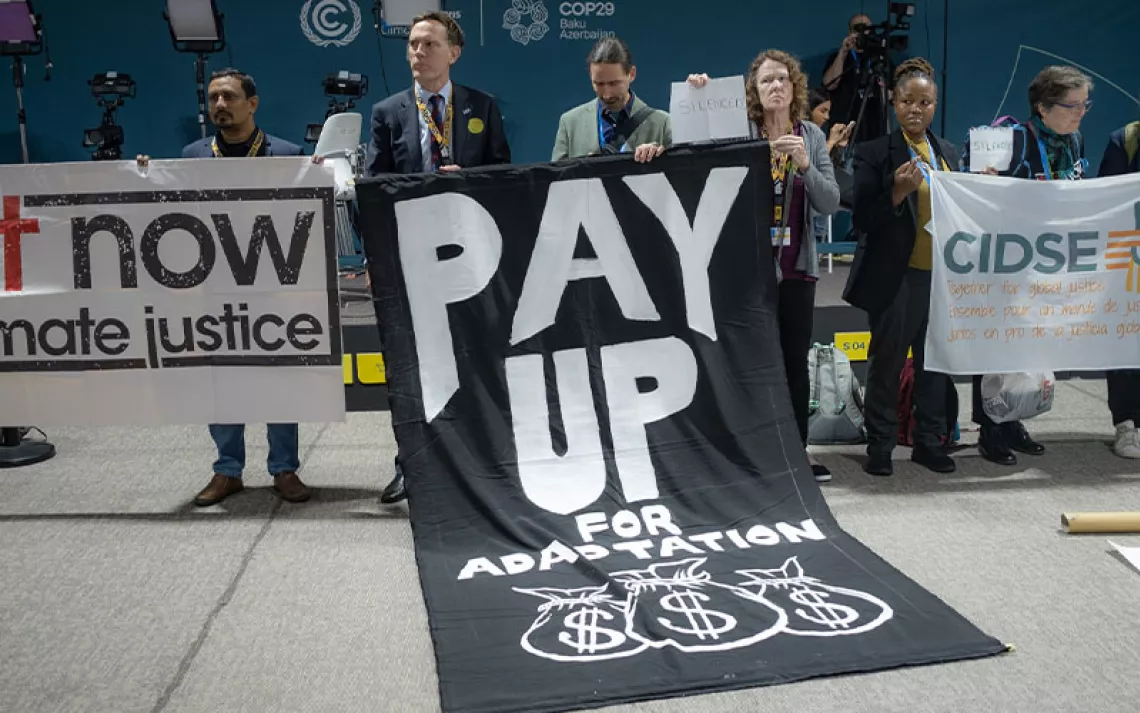“You Can’t Change the Channel.” Late Night TV Show Hosts Take on Climate Change.
Sierra’s rundown of the good, the bad, and the surprisingly funny

Photo by Jon Jones/Relation Agency
The looming existential threat of climate change is not exactly great material for jokes, but on Wednesday night, TV’s late-night hosts gave it a try. In conjunction with Climate Week NYC—a weeklong summit dedicated to promoting solutions to the climate crisis—all seven shows had segments on climate change. Not all of the jokes landed with a punch. (Really, Colbert? An interview with an animated Mother Earth?) But Sierra applauds the effort to put this incredibly pressing issue in front of a larger audience, and in a way that may be more accessible than, say, the latest IPCC report. Here’s a rundown of the good, the bad, and the outright funny.
The Late Show With Stephen Colbert on CBS
Colbert devoted much of The Late Show to the topic of climate change. The episode begins with a faux commercial for a special brand of condoms called “Trojan Buzzkill.” In the mood? Open up a packet to find a startling fact about climate change—for example, “July 2021 was the hottest month ever.” Only Colbert could get a chuckle out of the fact that one-third of Americans 45 and under are too worried about the future of the planet to reproduce.
In his long opening monologue, Colbert offers up an impressive overview of the crisis while peppering the bad news with hilarious one-liners. When describing how Hurricane Ida dumped so much rain on New York City that sections of the subway flooded, he mimics the dry perfunctory announcements of a train conductor over an intercom, saying, “Ladies and gentlemen, please stand clear of the doors and the apocalyptic tidal wave.”
Colbert also touches on a recent dire UN climate report, climate anxiety among the young (56 percent agree with the statement that humanity is doomed), and the broader public’s climate apathy: “Americans treat climate change like soccer. We know it’s out there and that it really matters to the rest of the world, but no one can make us care about it.”
He wraps up the segment talking about the carbon footprint of big oil companies, the fallacy of pinning our hopes on individual actions, and the need to push for systemic change and government intervention (“If the government hadn’t intervened, we’d still be eating lead paint chips!”). Overall, Colbert handles the topic deftly, clearly presenting facts in a relatable way that doesn’t leave the audience curled up in the fetal position, and yes, even makes them laugh. Climate communicators take note! —Wendy Becktold
Full Frontal With Samantha Bee on TBS
At first it seems like Samantha Bee didn’t get the assignment. She starts with a solid summary of what combined sewage is, describes how poorly maintained and outdated the country’s sewer system is, but then digresses into a discussion of fatbergs (a.k.a. those giant sewer-system clogs made of tampon applicators, baby wipes, condoms, and grease—apparently the source of 75 percent of NYC sewage backups in 2018). Vile, sure, but not really connected to climate change.
But then, at minute 3:40, Bee reveals that she has been on course all along. “Even if we stopped clogging our system with rat kings of human grossness,” Bee says, “our sewage infrastructure would still be in trouble because it wasn’t designed for our changing climate. As the planet warms up, heavy storms are producing vastly more rainfall in short periods of time—that’s led to catastrophic flooding and sewage overflows around the country, and not just in the liberal urban hellholes you’d expect, but also in the red states that God doesn’t hate.”
By the time we hit minute five, the segment has dived into environmental racism and infrastructure—specifically in a Black neighborhood in Lowndes County, Alabama, that is getting flooded by an overflowing sewage lagoon that residents don’t even have the privilege of pooping into (the lagoon is for a wealthier neighborhood). By the time we get to the kicker—“Sanitation is a human right! Unless you’re at an outdoor music festival, in which case it is a distant memory!”—Bee has connected politics, science, infrastructure, racism, climate change, and Ashton Kutcher’s parenting skills in a way that should impress anyone who has despaired over how to write about the climate in a way that won’t bore themselves—or anyone else—to tears. —Heather Smith
Jimmy Kimmel Live on ABC
Jimmy Kimmel starts his "Climate Change Intervention" with a Greatest Hits reel of climate denial: James Inhofe with his snowball, smarmy Ted Cruz saying "there's never been a day in the history of the world when the climate's not changing," preachers thundering against climate scientists for complaining about God's weather. Kimmel emphasizes that climate change is something no one can escape: "Don't even think of switching to another show; we're all focused on this topic tonight. You can't escape; it's basically an intervention. Our future is in jeopardy. You know that show, Jeopardy, that's all screwed up? This is even worse than that."
Trying to make the stakes clear, Kimmel forecasts a future without beer, coffee, or chocolate. "Imagine a world where you get a carrot cake for your birthday—it's a nightmare." "Climate change could even lead to massive shortages of rosé—I want to see if the white women were listening."
At about eight minutes in, Kimmel says, "We are a bunch of golden retrievers sitting in a hot parking lot right now, and our owners refuse to roll down the windows," which he follows with an extended riff on ConocoPhillips’s plan to refrigerate the Alaskan tundra so it can drill for more oil to warm the planet further. Then he segues into a well-done faux advertisement that starts out with chilling the tundra and goes from there. "When food runs low, we don't quit. We turn to cannibalism, feasting on human flesh to keep on drilling until the earth's destroyed and everyone's dead."
To Kimmel's credit, he ends the 10-minute segment with a plea to do something that matters: Call on Congress to pass President Biden's Build Back Better plan with its funds for a clean-energy infrastructure for the country. "Tell them that if they don't do something about this catastrophe that's coming our way, when the food supply gets low, they're going to be the ones we eat first." —Paul Rauber
The Daily Show With Trevor Noah on Comedy Central
The Daily Show’s Trevor Noah tries a little too hard to be original in his segment on climate change, deciding to focus on the “little weird effects of climate change that nobody sees coming” instead of all the boring stuff like hurricanes, floods, and rampaging wildfires that the show’s writers must have decided everybody already knows about. We learn that climate change threatens the production of coffee, beer, and wine and that on hot days, people have less sex. We also learn that as the atmosphere warms, it thins, causing space junk to hang around longer. Lastly, we find out that the extreme drought caused by climate change proved to be an excellent recruiting tool for the Taliban. Sounds kind of random, but not to Noah. “We could be headed to a future,” he says, in which “your sex-starved husband gets killed by space junk on the way to join the Taliban.”
Noah does display his mastery of the subject when he interviews Greta Thunberg by video, and he even manages to inject some fun with a made-up game in which he forces Thunberg to choose which of two items are worse for the climate: TikTok or Snapchat? The Eiffel Tower or the Statue of Liberty? Dogs or kittens?
Jokes aside, Noah invites Thunberg to make her case for activism: “Fully knowing what [climate change] means makes you want to do things. It makes you active.” —Wendy Becktold
Late Night With Seth Meyers on NBC
Seth Meyers prefers the term “global weirding” to “global warming” during “A Closer Look,” a segment that explores the unusual. Recapping the year’s unprecedented weather events—wildfire smoke extending across the entire continental United States; multiple one-in-500-year rain events occurring in New York City and Philadelphia; extreme cold in Texas—Meyers ventures into bizzaro territory. He assumes the role of a velour tracksuit-clad tornado from New Jersey, pitches a postapocalyptic flick starring Brad Pitt as a depressed marine biologist determined to save the world’s last dolphin, and twice sings a remix of a Billy Joel classic, "Actually, We Did Start the Fire." Ultimately, Meyers makes his way to the Infrastructure Bill, projecting a serious tone and voicing his support for Bernie Sanders and the bill’s backers. “The transition to clean energy is actually cheaper and more cost-effective than fossil fuels,” he says. “We just need it to happen faster before we reach the tipping point of irreversible climate destruction.”
Here are some of the funniest lines:
[On tornados touching down in New Jersey] “New Jersey tornados! New Jersey Tornados sounds like an Arena Football League team.”
[Personifying a tornado with an Italian American accent, stuck in New Jersey Turnpike traffic] “Heyyy, let’s go! Some of us have trees to uproot!”
[On Joe Manchin] “How is it acceptable that the guy writing our climate policy personally profits from coal? It’s like if instead of hiding his gambling, Pete Rose called his bookie from second base.”
[Referring to the rainfall in New York] “It used to be that a once-in-500-year event was the F train arriving on time, or the Jets starting the season 2–0.” —Christian Thorsberg
The Late Late Show With James Corden on CBS
In this episode, James Corden fulfills his obligations to Climate Week, but not much more. With barely a mention of fossil fuels or carbon dioxide, viewers don’t get a clear sense of what climate change actually is or what’s causing it. Reggie Watts, Corden’s bandleader, provides an especially awkward definition: “The burden on the environment from human causation.”
Corden does mention that Lego has plans to make bricks out of recycled plastic bottles. “There’s no word yet as to whether they’ll still hurt just as much when you accidentally kneel down on one,” he says.
He also remembers how, in response to a campaign in the UK to get everyone to stop leaving their TV on standby, he faithfully turned his set off. “And then I went to Vegas and the Strip was just lit up all night, and I remember thinking, ‘I don’t think my TV is going to make a dent here.’”
But the episode does deliver at the end. Corden devotes the entire last segment to climate change and gives his guest Bill Gates plenty of room to talk about solutions: going green in your personal life and keeping up the pressure on politicians for large-scale changes like the infrastructure deal and the budget reconciliation bill. —Abe Musselman
The Tonight Show Starring Jimmy Fallon on NBC
Over at NBC’s The Tonight Show, host Jimmy Fallon and his writers decided to dodge the challenge of making climate change funny. The only scripted joke is a wan one-liner in the opening monologue in which Fallon quips, “Of course, some people are sad that summer’s over. But good news—thanks to climate change, it’s not.”
Instead of attempting to craft some punch lines out of climate chaos, Fallon (who is studiously apolitical compared with the other late-night hosts) made the probably wise choice to just pass the mic to environmental éminence grise Dr. Jane Goodall. During a six-minute segment, Goodall talks briefly about her latest book, The Book of Hope, and plugged the Trillion Trees Campaign to reforest the planet. Goodall makes a lovely plea about humans’ connection to the natural world: “We need it. We’re part of it. We depend on it.” And then gave a shout-out to the youth climate movement: “They’re taking action. And they’re saying, ‘This is our future, and we’re going to do something about it.’”
Fallon then promises that The Tonight Show will also plant a tree, as he plops a tiny sapling on his desk. Though with that smarmy grin of his, it's hard to tell whether he's joking. —Jason Mark
 The Magazine of The Sierra Club
The Magazine of The Sierra Club



